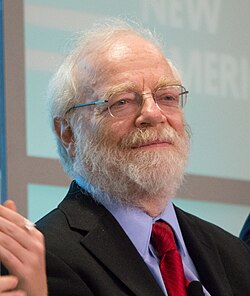Steven Bellovin: Difference between revisions
Pat Palmer (talk | contribs) mNo edit summary |
Pat Palmer (talk | contribs) mNo edit summary |
||
| (2 intermediate revisions by the same user not shown) | |||
| Line 1: | Line 1: | ||
{{subpages}} | {{subpages}} | ||
{{Image|Steven M Bellovin 2016.jpg|right|250px|Steven Bellovin in 2016.}} | {{Image|Steven M Bellovin 2016.jpg|right|250px|Steven Bellovin in 2016.}} | ||
'''Steve M. Bellovin''' is a computer security expert who was at Bell | '''Steve M. Bellovin''' is a computer security expert who was at [[Bell Laboratories]] for many years and, as of 2010, is at Columbia University. He has long been active in the [[Internet Engineering Task Force]] (IETF). He was a member of the Internet Architecture Board 1996-2002, and IETF Security Area co-director, and hence a member of the Internet Engineering Steering Group (IESG), 2002-2004. | ||
Bellovin's home page at [[Columbia University]] states: "I do research on networks, security and why the two don't get along." Bellovin was a participant on the Cypherpunk mailing list and on its successor, Perry Metzger's cryptography list. | Bellovin's home page at [[Columbia University]] states: "I do research on networks, security and why the two don't get along." Bellovin was a participant on the Cypherpunk mailing list and on its successor, Perry Metzger's cryptography list. | ||
While a graduate student, Bellovin was one of the people who created Usenet. He and two others — Tom Truscott and Jim Ellis — received the Usenix associations Flame award for this in 1995. | While a graduate student, Bellovin was one of the people who created [[Usenet]]. He and two others — Tom Truscott and Jim Ellis — received the Usenix associations Flame award for this in 1995. | ||
With William Cheswick, he introduced the concept of | With William Cheswick, he introduced the concept of a [[firewall]]. <ref>{{citation | ||
| title = Firewalls and Internet Security | | title = Firewalls and Internet Security | ||
| author = Steve Bellovin and William Cheswick | | author = Steve Bellovin and William Cheswick | ||
Latest revision as of 12:36, 9 September 2024
Steve M. Bellovin is a computer security expert who was at Bell Laboratories for many years and, as of 2010, is at Columbia University. He has long been active in the Internet Engineering Task Force (IETF). He was a member of the Internet Architecture Board 1996-2002, and IETF Security Area co-director, and hence a member of the Internet Engineering Steering Group (IESG), 2002-2004.
Bellovin's home page at Columbia University states: "I do research on networks, security and why the two don't get along." Bellovin was a participant on the Cypherpunk mailing list and on its successor, Perry Metzger's cryptography list.
While a graduate student, Bellovin was one of the people who created Usenet. He and two others — Tom Truscott and Jim Ellis — received the Usenix associations Flame award for this in 1995.
With William Cheswick, he introduced the concept of a firewall. [1] [2]
He has written on issues in the technical control of nuclear weapons, especially Permissive Action Links.[3]
References
- ↑ Steve Bellovin and William Cheswick (1994), Firewalls and Internet Security, Addison-Wesley
- ↑ William R. Cheswick, Steven M. Bellovin, and Aviel D. Rubin (2003), Firewalls and Internet Security: Repelling the Wily Hacker, Second Edition, Addison-Wesley
- ↑ Steven Bellovin (21 October 2005), Permissive Action Links, Nuclear Weapons, and the History of Public Key Cryptography, Department of Computer Science, Columbia University
